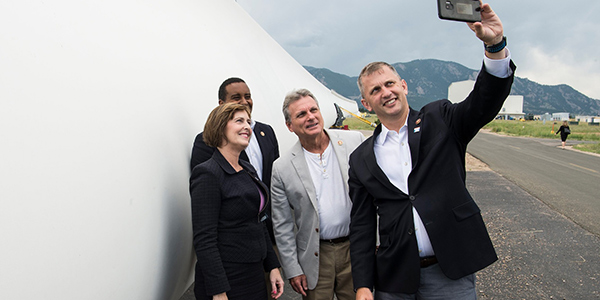Rep. Sean Casten (D-Ill.), who previously worked as a clean energy consultant and co-founded a company that developed waste energy recovery plants, said his transition from the private sector to Congress in 2018 was “surreal.”
“When I was running clean energy companies with a mission to profitably reduce greenhouse gas emissions we always prioritized the laws of thermodynamics over the laws of man. And in this new line of work, it is considered rare and exceptional to actually insist on what is scientifically necessary,” Casten, who holds master’s degrees in engineering management and biochemical engineering, told the American Council on Renewable Energy’s (ACORE) Grid Forum last week. “For 30 years we have prioritized the politically possible over the scientifically necessary. We do not have another 30 years to wait.”
No Time for ‘Unicorn Sales’

In a keynote speech, Casten called for eliminating the current $615 billion in annual fossil fuel subsidies, which he said “will unleash a ton of private capital.”
Getting to net zero carbon emissions will require the U.S. to double the efficiency of its energy system (energy use per dollar of GDP), which would put the U.S. at Switzerland’s level, he said.
The nation also needs “massive” research and development spending to decarbonize industries. “If you can’t say how you’re going to make steel without metallurgical coke, if you can’t say how you’re going to make fertilizer without natural gas, you are not contributing to the conversation. You are selling the unicorn. We do not have time to be in the unicorn sales business.”
Energy Price Act
Casten has co-authored several pieces of legislation to address the challenge.
The Energy Price Act would clarify that FERC has the responsibility to ensure that public utilities take into account greenhouse gas emissions when setting their electricity rates. The bill, introduced earlier this year, has not seen any committee action. (See related story, FERC, DOE, Interior Keys to Biden Climate Plan.)
“The deployment of clean energy creates huge problems. … Namely, clean energy’s too damn cheap. And every time we deploy a zero marginal cost generator on an electric grid that prices to the highest marginal cost generator, the price of power comes down and the investment thesis gradually erodes for building new assets. What happened to the nuclear industry happened to the cogen industry, and it’s going to happen to the clean energy industry as well,” Casten said.
“When I started my career you could get $60-$70 [/MWh] PPAs. Now you’re lucky to get $20-25 [/MWh] on a spot price market.”
“That creates an awesome problem: How do we better allocate … that economic gain of clean energy [so that it] flows appropriately between consumers and investors and flows to the right assets? What we developed in this Energy Price Act is basically a sense of the Congress resolution, but it was meant to be a shot across the bow … Several of the current [FERC] commissioners have privately been favorably disposed to our approach on that.”
Tradeable Performance Standard Act

Casten said the Tradeable Performance Standard Act, introduced last month, would eliminate about 40% of U.S. net greenhouse gas emissions by 2040 by creating tradeable emission allowances for the electric and industrial thermal energy sectors.
“It’s an idea that we developed way back when RGGI was being negotiated. It essentially recognizes that if you’re going to have a market you have to get paid to reduce carbon the exact same amount you pay to release it, and to recognize that there is always going to be political pressure to provide free allowances.
“We’ve got to get to greenhouse gas pricing, [but] most things that we use to describe carbon pricing fail a really simple market test, which is to say: Does the amount you pay to emit a ton of carbon equal the amount you receive if you reduce a ton of carbon? If you are going to go build a solar panel, a wind turbine or a geothermal plant and you can’t identify a specific cash flow stream that you will realize for reducing that CO2 [and] the guy building a coal plant can’t identify a specific cash penalty, then it ain’t a market.”
Uniform Reporting of Climate Risk
The Climate Risk Disclosure Act, which Casten introduced with Rep. Matt Cartwright (D-Pa.) and Sen. Elizabeth Warren (D-Mass.), cleared the House Financial Services Committee in July 2019 and had a hearing in the Senate Committee on Banking, Housing, and Urban Affairs on Nov. 17. It has 16 Senate co-sponsors and 35 House co-sponsors, all Democrats.
The bill would direct the SEC to develop a consistent set of standards to quantify exposure to, or hedging against, climate risk. Casten likened it to “a FASB for ESG,” referring to the Financial Accounting Standards Board, which sets the Generally Accepted Accounting Principles (GAAP) rules for public U.S. companies, and environmental, social and corporate governance — ways to measure a company’s sustainability and societal impact.
A related bill sponsored with Sen. Brian Schatz (D-Hawaii), the Climate Change Financial Risk Act, would direct the Federal Reserve to conduct stress tests on large financial institutions to measure their resilience to climate-related financial risk.
“There’s lots of subjectivity in financial liabilities, but there are consistent ways that they get reported. And as long as everybody understands that, then [they can price] capital accordingly,” Casten said. Currently, he said, “it’s hard to argue that markets are efficiently allocating capital.”




